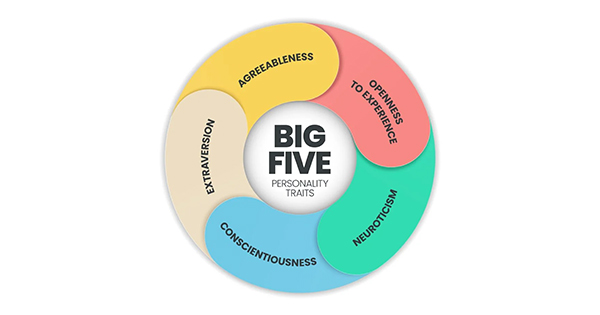One area that has been increasingly explored in recent years is personality traits and how they may impact upon self-care behaviours (Dimou et al, 2023). This article seeks to explore the literature in relation to personality traits and self-care behaviours and consider whether there are implications we can take from this into clinical practice — particularly in relation to the high-risk foot.
The ‘Big 5’
Personality traits are typically stable and enduring emotions, patterns of thought and the behaviours that can distinguish people from each other (McCrae and John, 1992). Dimou et al (2023) explain that personality traits represent the consistent ways in which a person will perceive the world and interact with it, as well as regulate their emotions and respond to emergent situations. Personality traits appear to have both positive and negative implications for health and self-care (Esmaeilinasab et al, 2016; Mendoza-Catalán et al, 2022; Dimou et al, 2023). This is not a new understanding in the context of diabetes, indeed, Slawson et al (1963) described the “diabetic personality” in the literature and linked this with poor prognosis and higher risk of medical complications.
The Big Five personality traits, also known as the Five Factor Model (FFM), are a widely accepted framework in psychology for understanding human personality (Komarraju et al, 2011; Soto and Jackson, 2013) and were originally described in the literature by McCrae and John (1992). These traits — and descriptions of them — are detailed below:
Openness (to experience) — this trait reflects a person’s curiosity, imagination, and willingness to try new things. Individuals high in openness tend to be creative, adventurous, and open-minded, while those low in openness may be more conventional and prefer routine.
Conscientiousness — this refers to the degree of organisation, responsibility, and self-discipline a person has. Those high in conscientiousness tend to be reliable, hardworking, and organised, while those low in conscientiousness may be more impulsive and disorganised.
Extraversion — this encompasses traits such as sociability, assertiveness, and energy level. People high in extraversion are often outgoing, talkative, and enthusiastic, while those low in extraversion may be more reserved and introverted.
Agreeableness — this reflects how cooperative, compassionate, and empathetic a person is. Individuals high in agreeableness are typically warm, trusting and considerate of others’ feelings, while those low in agreeableness may be more competitive and sceptical.
Neuroticism (emotional stability) — this refers to the tendency to experience negative emotions, such as anxiety, depression and insecurity. Individuals high in neuroticism may be prone to mood swings and worry, while those low in neuroticism tend to be more emotionally stable and resilient.
Personality theorists have widely embraced this model as it does help to capture nuanced differences in personality and can provide a means for some generalisability to help study specific phenomenon pertaining to human behaviour (Komarraju et al, 2011). The influence of the FFM traverses across multiple fields including psychology, health psychology, education, occupational assessment and satisfaction and performance measures (Dimou et al, 2023).
The ‘Big Five’ personality traits have been extensively studied and the literature indicates that they are, indeed, associated with various aspects of health-related behaviours. Joyner et al (2018) in their review of the FFM and its association with health behaviours broadly found the following: Individuals high in conscientiousness tend to engage in healthier behaviours. They are more likely to adhere to medical treatments, follow recommended health guidelines, maintain regular exercise routines, and have healthier dietary habits; Extraversion is associated with certain health behaviours, though the relationship may vary depending on specific aspects of extraversion. For example, extraverts may be more likely to engage in social activities that promote wellbeing and may seek out social support, which can have positive effects on health. However, they may also be more prone to engaging in risky behaviours, such as excessive alcohol consumption or impulsivity; Openness to experience is often associated with curiosity and a willingness to try new things, which can extend to health-related activities, such as exploring alternative medicine or adopting unconventional health practices.
However, the relationship between openness and health behaviours can be complex and may depend on other factors; Agreeableness is linked to behaviours that foster social harmony and cooperation, which can have implications for health behaviours. Individuals high in agreeableness may be more likely to seek social support and engage in behaviours that promote interpersonal relationships, which can contribute to better overall health. They may also be more compliant with medical treatments and recommendations. Finally, neuroticism is often associated with negative affect and emotional instability, which can influence health behaviours. Individuals high in neuroticism may be more prone to stress-related behaviours, such as emotional eating, smoking or substance abuse. They may also have difficulty adhering to health recommendations due to heightened anxiety or worry about health issues (Joyner et al, 2018; Kim, 2022). However, it has been important to try and establish if these generalisations personality traits and their association with health behaviours is extrapolatable to more specific clinical/medical scenarios.
Dimou et al (2023) undertook a systematic review and meta-analysis on the association of personality traits and self-care behaviours in people with type 2 diabetes mellitus. Their review analysed 23 separate studies looking into this question and found that Openness, Conscientiousness and Agreeableness were associated with improved foot care compliance whilst Extraversion and Neuroticism appeared to be associated with decreased medication adherence (Neuroticism was especially associated with lower overall self-care behaviours more generally).
Openness being linked to high compliance with foot-care and general self-care behaviours is consistent as openness as a personality factor is particularly related to adaptive coping (Lawson et al, 2010). Moreover, people with high levels of openness are described as curious, and open to new and different ideas and is attracted to novelty (McCrae and John, 1992). Thus, it could be argued that the development of diabetes and living with diabetes may represent a new experience for them and the requisite lifestyle changes needed to stave off future health problems (such as foot care) may be approached with a greater level of openness compared to individuals who score lower in this trait (Dimou et al, 2023).
Like Openness, Conscientiousness being associated with greater foot self-care behaviours is not an unexpected finding. Conscientiousness has been described as being orderly, accepting of rules, dutiful and achievement-focused and these traits appear to instinctively map well onto following prescribed medical instructions (Hill and Roberts, 2011; Roberts et al, 2014). Agreeableness was the other trait associated with good foot care compliance (Dimou et al, 2023) and this, too, appears to be an explicable finding as agreeableness is often defined as people who are modest, compliant and trusting (McCrae and John, 1992), thus, in service of maintaining a constructive attitude and more oriented towards following medical/healthcare advice given by professionals (Dietmaier et al, 2022).
While the systematic review and meta-analysis conducted by Dimou et al (2023) did not find any direct association between Extraversion and foot care behaviours or Neuroticism and foot care behaviours, respectively, both of those traits were associated with lower overall-self care behaviours more broadly. Thus, it would not be unreasonable to consider that this could, in some instances, extend to include foot self-care behaviours also. Extraversion has often been linked to lifestyle behaviours that are conducive to the development of type II diabetes specifically (such as unhealthy eating habits and a more sedentary lifestyle devoid of physical exercise) (Rhodes and Smith, 2006; Mõttus et al, 2012). Neuroticism, meanwhile, is known to manifest as high-stress responses to negative emotions (Soto and Jackson, 2013) which, in itself, is considered a risk factor for depression (Yasui-Furukori et al, 2019). Depression, in turn, is a major predictor for poor self-care behaviours (Gonzalez et al, 2008; Hill, 2022).
The systematic review and meta-analysis by Dimou et al (2023) does provide some useful evidence to evaluate potential links between personality trait and self-care behaviours — particularly in the context of foot self-care. However, the results are not definitive as there were some limitations to the study as is usually the case. The studies looked at within the review were relatively few and the primary outcome measures in the reviewed studies were narrow and some lacked substantial evidence to draw conclusions from. That said, by combining the results from various studies and re=analysing them, this has added a level of statistical weight to the paucity of evidence hitherto in the literature. The findings from it are also consistent with other studies looking at the association of personality with foot self-care.
Murphy et al (2021) undertook a study to determine if personality and mood difficulties predicted foot self-care in diabetes. They used the ‘ABCD’ personality types first proposed by Friedman and Rosenman in the 1950s. Type A personality is characterised by being competitive, ambitious, are perfectionists and are achievement-oriented. They are also more prone to experiencing stress and may be impatient, easily angered, and have a sense of time urgency (Explore Psychology, 2024). People with a Type B personality are typically laid-back and easy-going. They are less likely to experience stress and may be more patient, creative and imaginative (Explore Psychology, 2024). Type C personality, meanwhile, has characteristics such as being analytical and focused on accuracy and detail. Type C persons are often introverted and strongly desire order, logic, and precision. They are also more prone to experiencing emotional stress (Explore Psychology, 2024). Finally, those with type D personality are typically anxious, worried, and have a negative outlook. They are also introverted and tend to keep their emotions to themselves (Explore Psychology, 2024). What Murphy et al, (2021) found was that type D personality was associated with sub-optimal health behaviours including foot self-care behaviours. In particular, these findings most closely align with the findings surrounding neuroticism and its association with fewer self-care behaviours by Dimou et al (2023). Thus, it appears that understanding personality traits of people with diabetes could be a key part of best helping them to foster good and effective foot care behaviours that, in turn, could reduce the likelihood of DFU development and amputation.
Considerations for practice
Despite self-care being a widely studied phenomenon in the context of diabetes, there is no consistent guidance available for healthcare professionals to help patients undertake and sustain foot self-care behaviours. In a study by Hill et al (2022), they suggest that better foot self-care behaviours may result from healthcare professionals focusing on supporting autonomous motivation for patient self-care and enhancing the rationale through referencing patients’ own experience rather than focussing on increasing patient knowledge. However, maybe an additional element to consider here is that as well as referencing patients’ own lived experiences, an evaluation of patient personality traits may enable deeper understanding of potential barriers and facilitators to foot self-care behaviours. In turn, accurate assessment of patient personality traits may enable for more tailored messaging and communication.
Successful diabetes care requires teamwork between practitioners and patients which is predicated upon trust. The cornerstones of this teamwork are effective communication between both parties and shared decision-making (Beverley et al, 2016). Patient autonomy is key here and the ability of the practitioner to promote an environment of genuine patient autonomy is vital to the quick and robust development of trust in the relationship (Von Korff et al, 1997; Nimmon and Stenfors-Hayes, 2016). Factors that influence a trustful and constructive relationship between patient and healthcare professionals are how the patient is treated during the consultation and how much time they perceive that they have been afforded in the consultation (Beverley et al, 2016). Verbal communication is central to how a patient feels they have been treated (Dickinson et al, 2017). This ranges from friendly greetings and a genuine interest in them as individuals through to the specific language used to describe the patient, their behaviour and/or their condition (Dunning et al, 2017).
Indeed, language is powerful and can have a strong impact on perceptions, behaviour and experiences and is the principal vehicle for the sharing of knowledge and understanding. Words are immediately shaped into meanings when people hear or read them and those meanings can affect how a person views him- or herself (Fleischman, 1999; Benedetti, 2008). The way a person views themselves and the beliefs they carry about their abilities and disease-state has been suggested to be a predictor for how they engage with their condition. Furthermore, it may be that different personality types/those with differing personality traits will respond differently to health messaging (Jongenelen, 2013; Blais et al, 2021), also impacting on how they may engage with their condition.
The other element that surrounds the development of a trustful and constructive relationship between patient and practitioner is that of the perception of time that a patient feels that they are afforded in the consultation (Bradbury and Price, 2011; Chitambo and Forbes, 2015; Coffey et al, 2019). While a lack of perceived consultation time is a frequent frustration of patients, it is also a frequent frustration voiced by clinicians (Stuckey et al, 2015). Interestingly, however, the systematic review by Riedl and Schübler (2017) indicated that skilfully trained clinicians in consultative techniques such as motivational interviewing (MI) did not need more time in their consultations to develop trust, rapport, meaningful conversation and, indeed, effective information exchange. This provided both clinicians and patients with the perception of seemingly longer consultation times and improved satisfaction levels for both parties.
Understanding a patient’s personality traits can greatly enhance a clinician’s ability to employ MI effectively. Ml is a patient-centred, goal-oriented approach to communication that aims to elicit behaviour change by exploring and resolving ambivalence (Arkowitz et al, 2015). By understanding patient personality traits, healthcare professionals can utilise MI more effectively in several ways. These include: Tailoring communication styles — different personality traits may respond better to specific communication styles. For example, individuals high in conscientiousness may respond well to structured goal-setting and action plans, while those high in openness to experience may appreciate exploration of novel approaches to behaviour change.
Clinicians can adapt their communication style and strategies based on the patient’s personality profile to enhance engagement and motivation (Bagby et al, 2016); understanding motivations and values — personality traits can provide insights into a patient’s underlying motivations, values, and priorities. Clinicians can use this understanding to frame behaviour change goals in a way that resonates with the patient’s personality. For instance, emphasizing the health benefits of behaviour change for individuals high in conscientiousness or highlighting the potential for personal growth and exploration for those high in openness (Komarraju et al, 2011; Bagby et al, 2016); addressing resistance and ambivalence — certain personality traits may be associated with greater resistance or ambivalence towards behaviour change. For example, individuals high in neuroticism may struggle with anxiety or fear of failure, while those low in conscientiousness may exhibit procrastination or lack of commitment. Clinicians can use MI techniques such as reflective listening, affirmations, and exploring ambivalence to address these concerns and facilitate motivation (Arkowitz et al, 2015; Bagby et al, 2016).
The challenges associated with incorporating patient personality traits into clinical practice are potentially substantial. While there are many personality tests that have been validated and can be completed relatively quickly via online assessment platforms etcetera, there remains the point that accuracy of such testing relies upon a combination of the tool that has been used as well as the professional analysing the results (Psychology Today, 2024). Thus, for allied health professionals to use such tools effectively would likely require some robust training in this discipline to ensure that the tool was not been using ineffectively or erroneously. While AI continues to provide new opportunities and avenues to provide effective assessment tools and screening, question marks still remain about the reliability of AI-generated results (Sng et al, 2023; Psychology Today, 2024). Nevertheless, this represents potential areas for exploration via further research to see if the apparent role of personality traits on self-care behaviours can be influenced by assessments of these traits to design consultative approach techniques to help foster good self-care. This could be an important tool in the battle to help prevent the development of DFUs.




